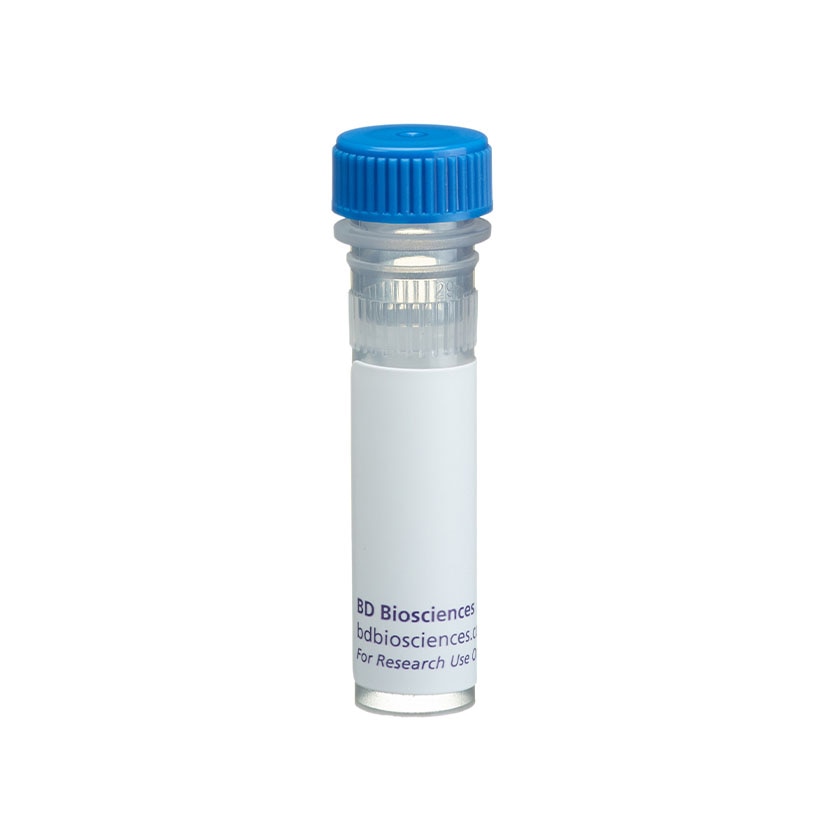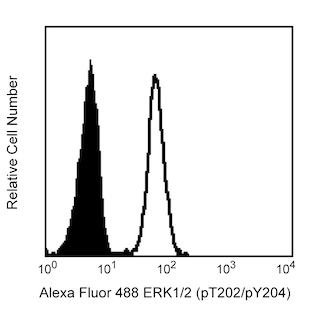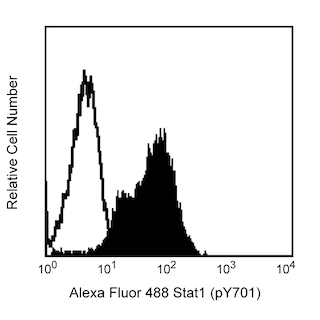Old Browser
Looks like you're visiting us from {countryName}.
Would you like to stay on the current country site or be switched to your country?





Analyses of MEK1 (pS218)/MEK2 (pS222) expression. Panel 1: Western blot analysis of MEK1/2 (pS218/pS222) expressed by Jurkat cells. Lysates (15 µg total cell protein/lane) from untreated (C) and PMA-treated (T) (Phorbol 12-Myristate 13-Acetate, Sigma, Cat. No. P8139; 50 nM, 15 min) Jurkat cells were blotted using Purified Mouse Anti-MEK1 (pS218)/MEK2 (pS222) antibody (Cat. No. 562457; 0.5, 0.25, and 0.125 µg/ml for Lanes 1, 2, and 3, respectively), HRP Goat Anti-Mouse Ig (Cat. No. 554002) and a chemiluminescent detection system. Panel 2a: Western blot analysis of MEK1/2 (pS218/pS222) expressed by human peripheral blood mononuclear cells (PBMC). Lysates from 1 million untreated (C) and PMA-treated (T) PBMC were blotted using Purified Mouse Anti-MEK1 (pS218)/MEK2 (pS222) antibody (2.0 µg/ml) as described above. Panel 2b: Flow Cytometric analysis of MEK1/2 (pS218/pS222) expressed by peripheral blood lymphocytes (PBL). Human whole blood cells were either not stimulated (dashed line histogram) or stimulated (solid line histogram) with 400 nM PMA (15 min, 37°C). Cells were fixed in 1X BD Phosflow™ Lyse/Fix Buffer (Cat. No. 558049; 10 min, 37˚C) and permeabilized in BD Phosflow™ Perm Buffer III (Cat. No. 558050) on ice (30 min). Cells were stained with BD Phosflow™ PE Mouse Anti-MEK1 (pS218)/MEK2 (pS222) (Cat. No. 562458) antibody. Fluorescence histograms showing MEK1/2 (pS218/pS222) expression were generated for gated events with the forward and side-light scatter characteristics of intact lymphocytes using a BD FACSCanto™ II Flow Cytometer System. Panel 3: Western blot analysis of MEK1/2 (pS218/pS222) expressed by mouse splenocytes. Lysates from 1 million untreated (C) and PMA-treated (T) mouse splenocytes were analyzed by Western blot with Purified Mouse Anti-MEK1 (pS218)/MEK2 (pS222) antibody (2.0 µg/ml) as described above. Note: MEK1/2 (pS218/pS222) were identified as ~45 kDa bands in all cell lysates by Western blotting.



BD Pharmingen™ Purified Mouse anti-MEK1 (pS218)/MEK2 (pS222)

BD Pharmingen™ Purified Mouse anti-MEK1 (pS218)/MEK2 (pS222)

Regulatory Status Legend
Any use of products other than the permitted use without the express written authorization of Becton, Dickinson and Company is strictly prohibited.
Preparation And Storage
Product Notices
- Since applications vary, each investigator should titrate the reagent to obtain optimal results.
- Please refer to www.bdbiosciences.com/us/s/resources for technical protocols.
- Caution: Sodium azide yields highly toxic hydrazoic acid under acidic conditions. Dilute azide compounds in running water before discarding to avoid accumulation of potentially explosive deposits in plumbing.
Companion Products






The O24-836 monoclonal antibody specifically binds to the human MEK1 pS218 and MEK2 pS222 phosphorylated sites. MEK1 and MEK2 (MEK1/MEK2) are ~45 kDa dual-specificity protein kinases that are also known as MAPK/ERK Kinase 1 and 2 and MAP kinase kinases (aka, MAP2K1 and 2, MAPKK1 and 2, or MKK1 and 2). MEK1 and MEK2 activation is dependent upon phosphorylation of certain amino acid residues including serine 218 (pS218) of MEK1 and serine 222 (pS222) of MEK2 by MAP kinase kinase kinases (MAP3Ks), such as by Raf kinases. MEK1/MEK2 can phosphorylate and thus activate the MAP (Mitogen-Activated Protein) kinases, ERK1 and ERK2. The ERK kinases are critically involved in multiple signal transduction pathways induced by growth factors, cytokines, and mitogens. These kinases regulate cellular growth, differentiation, survival, motility and angiogenesis. Dysregulated activation of MEK1/2 is observed in tumor cells. During antibody development, the purified O24-836 monoclonal antibody was found to detect phosphorylated MEK1/MEK2 by Western blot analysis of cellular lysates and by indirect immunofluorescent staining and flow cytometric analysis of fixed and permeabilized cells. This antibody crossreacts with phosphorylated MEK1/MEK2 expressed by mouse cells as tested by Western blot analysis and immunofluorescent staining and flow cytometric analysis.
Development References (5)
-
Crews CM, Alessandrini A, Erikson RL. The primary structure of MEK, a protein kinase that phosphorylates the ERK gene product. Science. 1992; 258(5081):478-480. (Biology). View Reference
-
Fremin C, Meloche S. From basic research to clinical development of MEK1/2 inhibitors for cancer therapy. J Hematol Oncol. 2010; 3(8):1-11. (Biology). View Reference
-
Kolch W. Meaningful relationships: the regulation of the Ras/Raf/MEK/ERK pathway by protein interactions. Biochem J. 2000; 351:289-305. (Biology). View Reference
-
Papin C, Eychene A, Brunet A, et al. B-Raf protein isoforms interact with and phosphorylate Mek-1 at serine residues 218 and 222. Oncogene. 1995; 10(8):1647-1651. (Biology). View Reference
-
Yoon S, Seger R. The extracellular signal-regulated kinase: multiple substrates regulate diverse cellular functions. Growth Factors. 2006; 24(1):21-44. (Biology). View Reference
Please refer to Support Documents for Quality Certificates
Global - Refer to manufacturer's instructions for use and related User Manuals and Technical data sheets before using this products as described
Comparisons, where applicable, are made against older BD Technology, manual methods or are general performance claims. Comparisons are not made against non-BD technologies, unless otherwise noted.
For Research Use Only. Not for use in diagnostic or therapeutic procedures.
Report a Site Issue
This form is intended to help us improve our website experience. For other support, please visit our Contact Us page.